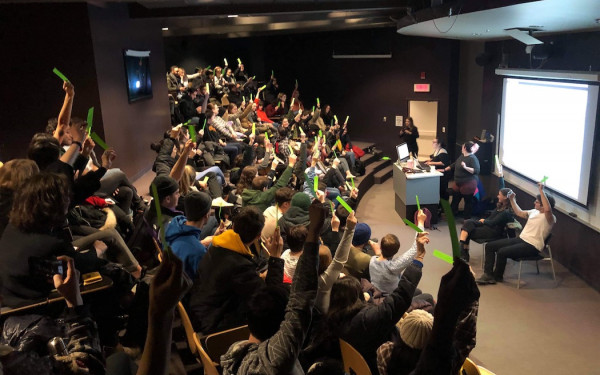Should Students Even Bother Getting Involved with Student Organizations?
I was involved in Concordia student politics and greatly despised it
A year ago, I was a fresh-faced first-year student with a bright big smile on my face eagerly waiting to get involved in as many clubs as possible. What better way to become acclimated to a new school than by joining its student-run organizations?
In the months that followed, I became the First-Year Director of the Political Science Student Association, a councilor on the Concordia Student Union, and a member of the Sustainability Action Fund.
During my mandates, however, I became incredibly critical of student politics.
There is no doubt that these organizations taught me a lot. I worked on and learned about creative projects across campus, including creating a resource guide for first-years, setting up a virtual suggestion box for political science students to voice their concerns about the department, and working alongside the main proponents of the menstrual equity project, among many things. I learned how student groups work with—or rather—against the administration, but I am getting ahead of myself for now. Not to mention, I met some really great people. Individuals who are driven by a passion to make their community a better place.
On paper, these clubs seek to do good. They represent students by communicating their needs and demands to the administration. When these two entities can’t work together, student organizations break off into smaller committees that target specific problems around campus, whether that be increasing sustainability, ensuring better representation for BIPOC students, promoting gender advocacy, etc. Committees then plan events and start initiatives to bring awareness to a cause that the administration often does little about.
Yet, there are fundamental flaws within the structure of student politics that make it difficult to fulfill these mandates.
Student organizations notoriously do not adequately train new members. I have never received any formal training for my former positions. While I was excited to represent first-year students on the PSSA, I spent the majority of meetings in the first few months of my mandate completely silent because I didn’t understand what was going on. Imagine starting at a new school and being thrown into a discussion about the distribution of funds for events you know nothing about. To make matters worse, I was put in the same predicament when I joined the CSU and the SAF.
The problem is that these organizations hold a lot more power than we might think. The CSU alone had $3,208,945 to spend on various activities, services, and events, according to their 2021-2022 budget report—which is just a snippet of their financial power. There is too much student money on the line to risk giving someone access to these funds without the proper training.
Members who lack training can easily agree to a decision without knowing much about it just because others or simply the majority of people are doing so. They might also make the wrong call because they didn’t know any better. I never felt like I was able to properly represent student needs because I wasn’t given the proper tools to do so.
I have the impression that many people in student politics aren’t there for the right reasons. I have come across one too many people who have expressed an interest in making a change but never actually doing anything about it.
A part of me doesn’t blame those people. Sure, some might just be in student politics to simply add something eye-grabbing on their CV, but for the most part, it is just useless to take any initiative because bureaucracy makes it impossible for anything to get done.
Possibly my most frustrating experience in the CSU and the SAF was when I took the initiative to create a free sustainable cookbook for students. For each step of my project, I had to get approval from someone above me. The project was never completed because meetings were held biweekly, leaving huge gaps of time before moving on to the next stage.
Student groups would be more effective if they weren’t organized in a pyramid structure. From my experience, when power dynamics are unequally distributed and someone who is less motivated, experienced, or simply has too much on their plate is at the top, nothing gets done—leaving the entire group to become unproductive.
In the cases when someone problematic is at the top of the pyramid, student organizations get more sidetracked with unnecessary drama and impeachments making it a toxic and difficult working environment to focus on our mandates.
While I think student politics aim to do good, significant improvements must be made. The sad truth is that I can have a greater impact on my community through other means, so for now, I will stick to student journalism and volunteering for community-led groups outside of Concordia.







